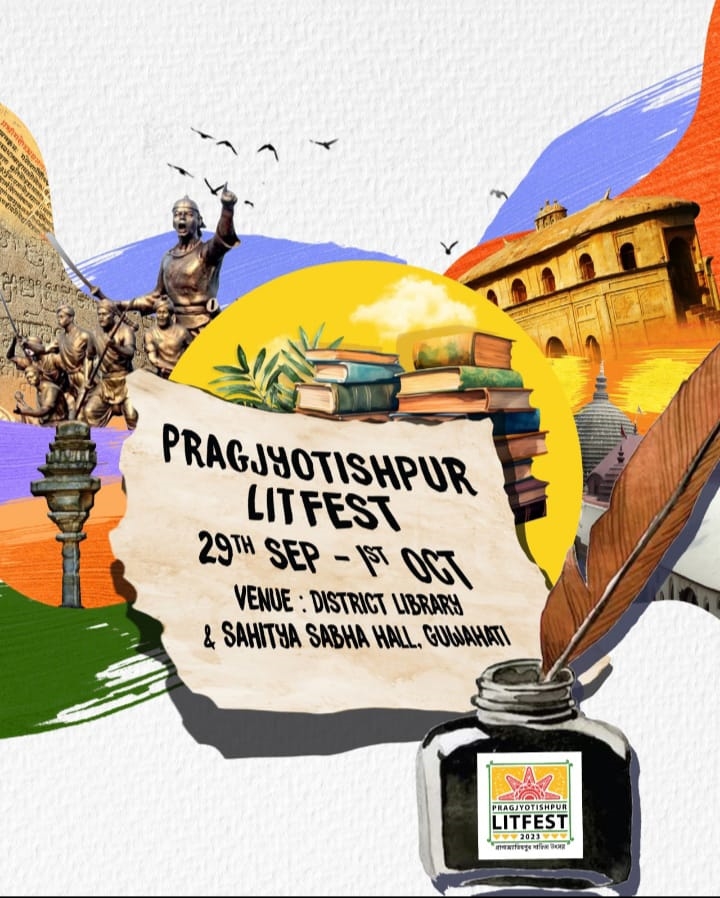An intellectual and interactive treat for literary enthusiasts, cultural connoisseurs, and budding writers is waiting to emerge as the Pragjyotishpur Literature Festival 2023 (PLF) will unfold a series of literary activities for three days in the virtual capital of Northeast India.

The three-day literature festival, organized for the first time by the Sankardev Education and Research Foundation (SERF), will kick start on September 29 at Asom Sahitya Sabha and district library premises in the heart of Guwahati city. Themed ‘In Search of Roots’, the national-level festival is aimed at showcasing the rich cultural heritage of the land and also encouraging the young talents to rediscover and redefine the legends of Pragjyotishpur.
Present-day Assam is the central part of the ancient kingdom named Pragjyotishpur (later also known as Kamrup), where its capital was located roughly in present-day Guwahati. The kingdom was spread to
Jalpaiguri, Koch Behar, Bhutan hills (including some parts of Nepal), Rangpur, Sylhet, Mymensingh, Dhaka (now under Bangladesh), Tripura, Khasi & Garo hills, etc. Pragjyotishpur (meaning the eastern part of Jyotishpur) gets its mention in both the great Indian epics Ramayana and Mahabharata as well as in Kalika Puran, Yogini Tantra and Charyapada.
Pragjyotishpur was pronounced by Lord Ram in the critical phase of his struggles after losing his wife Seeta. On the other hand, the powerful king of Pragjyotishpur, Bhagadatta fought along with the Kauravas (against Pandavas) in the battle of Mahabharata. When it came to exist as the Kamrup kingdom, legendary king Kumar Bhaskarvarman used to rule over the land. Bhaskarvarman enjoyed a dignified and mutually respected relationship with emperor Harshavardhan (of Kanauja and Thaneswara) and often sent valuable books as gifts to Harshavardhan. He was a vibrant patronizer of ancient Nalanda University, one of the greatest centers of learning across the globe.
Pragjyotishpur itself was an abode of learning, publications, and intellectual exercises as these were the oldest traditions and practices for the residents. Many valuable books were written in this part of the world, where Madhav Kandali’s Ramayana in a local language signifies the dimension and intellectual capacity of an author. The society used to promote the learning and redefining of general science, Ayurveda and traditional healthcare, astrology, craftsmanship, and both performing and visual arts. The residents still carry the legacy of ancient Indian culture, developed since the pre-historic days.
Through the PLF initiative, the young generation will come to know and realize the greatness of the ancient cultural diversities of the land. With the series of discussions, interactive sessions, thematic quiz
competitions, and literary recitations, the unique festival is expected to mobilize the young writers to connect with their roots of civilization through literature. National Book Trust-India chairman Prof. Milind Sudhakar Marathe (a recognized author-critic), Padmashree Lil Bahadur Chetri (a noted Gorkha writer), Pankaj Chaturvedi (Delhi), Suvash Chandra Satapathy from Bhubaneshwar, Bhushan Bhave from Goa, television news personality Rubika Liyaquat along with a number of distinguished writers, translators, literary critics from various parts of the country as well as northeast Bharat are gracing the
occasion to add more color to the festival.
Meanwhile, pre-events for the festival were organized in Dhubri Bholanath College, Dibrugarh H Surajmall Kanoi College, Dhemaji Balika Vidyalaya, North Lakhimpur College, etc. with great enthusiasm from hundreds of novice writers, book-enthusiasts and promising young talents. Inspired by PLF working president Soumyadeep Datta, a few more such literary awareness programs are on the card, where the ancient civilizations of the great nation will be celebrated. PLF President Phanindra Devchoudhury expects a fruitful exercise showcasing eastern India’s rich history, culture, and languages, where the literary activists will brainstorm to rediscover their own past and pave the way for futuristic and purposeful literary works.






